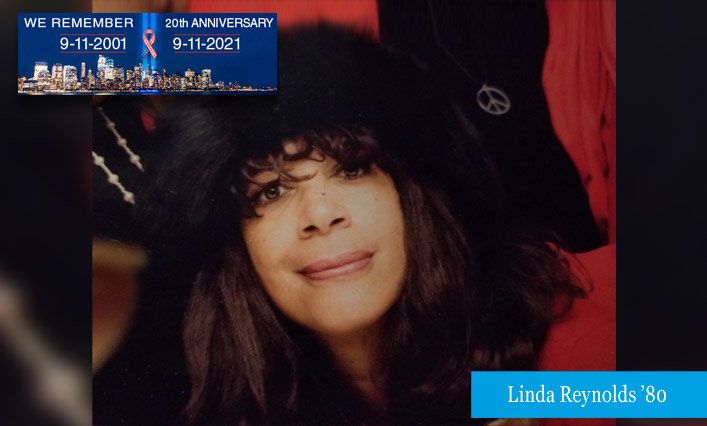
Linda M. Reynolds ’80, retired Chief Deputy Sheriff in the New York City Sheriff’s Office, the first African-American woman to be appointed to the role, vividly remembers the chaos in the streets on the morning of September 11, 2001. “I was a first responder at the site and saw the horrendous devastation, the people dying, and the buildings coming down,” says Reynolds, holding back tears. “When I woke up that morning, it was a beautiful September day; it was warm and sunny. Never in my wildest dreams did I think it would be one of the worst days of my life.”
“I was a first responder at the site and saw the horrendous devastation, the people dying, and the buildings coming down.” —Linda Reynolds
Candidly speaking about the day, Reynolds recalls the panic, fear, and confusion being experienced by everyone at the World Trade Center site. “As the Chief, I was organizing deputies and getting as many officers as I could from the field offices in the five boroughs to come in and head to the site. We were also working with the triage unit. We found ourselves trying to bring comfort to those who had escaped the towers. It was a whirlwind nightmare that I just couldn’t believe.” While trying to keep order at the site and bring calm to the victims, Reynolds also couldn’t help thinking about her colleagues as they entered the burning buildings. “Police, firefighters, everyone wanted to go in and do anything they could to help.”
Finding Hope After the Tragedy
In the days that followed the tragedy, Reynolds witnessed unimaginable heartache, but she also experienced several uplifting moments that reminded her of the inherent kindness of the human spirit. “There were so many people from all over the country who wanted to support us. Every state sent volunteers to help with the recovery, and when they arrived, it felt like we had known them forever. They wanted to feed us, to clothe us—I still have all the T-shirts from the other departments across the country—it was just unbelievable, and to me it represented what this country should be—united, kind, and caring 24/7, 365 days a year.”
“Every state sent volunteers to help with the recovery, and when they arrived, it felt like we had known them forever. They wanted to feed us, to clothe us—I still have all the T-shirts from the other departments across the country—it was just unbelievable, and to me it represented what this country should be: united, kind, and caring 24/7, 365 days a year.” —Linda Reynolds
One particularly memorable moment for Reynolds was when a famous athlete wanted to stop by Ground Zero. “We learned that Muhammad Ali, ‘the World’s Greatest’ wanted to meet and speak with the workers at the site. Three other deputies and I met with him and his wife at the airport upstate and drove him to Ground Zero,” she says. “We took him around the site so he could see, and I remember how taken aback he was by the devastation around. He knew his celebrity would make people happy, and even though he had Parkinson’s disease, he still had that wit and humor that he was known for. When he met the workers, he wanted them to know that he was with them and praying for them. The workers really appreciated it.”
Commemorating the Anniversary
Those moments of kindness and service in the aftermath of 9/11 have created a ripple effect these last 20 years, with the creation of the 9/11 Day, National Day of Service and Remembrance. The day provides everyone the opportunity to perform an act of service, no matter how small, in tribute to those killed and injured on September 11, 2001. For Reynolds, being of service, especially on this day, is how she chooses to commemorate the anniversary each year. “I usually participate in the Pack-A-Million Meals event where people from across the country come together and help pack meals and food packages to feed the hungry and those facing food insecurity. To me, it feels like the best way I can honor those we lost on 9/11,” she says. “It’s about helping someone in need, and that’s what we saw on 9/11, first responders and citizens alike helping those in need. It’s what we saw during the recovery in the days and weeks after, people, without hesitation, responding to the calls for help. I believe that we should never forget, and that we should always be of service.”
“The way to ensure a tragedy like 9/11 never happens again is through education, and if any institution can train anyone to investigate and prevent terrorism, it’s John Jay College.” —Linda Reynolds
Ensuring It Never Happens Again
Reynolds is also doing her part to make sure a day like 9/11 never happens again, establishing the Linda M. Reynolds Terrorism Studies Fellowship, for the Center on Terrorism at John Jay College. “After the tragedy, we learned that the agencies on the city, state, and federal levels weren’t communicating with each other, there was no open line of communication,” she says, explaining how the missed information led to the disaster. “The way to ensure a tragedy like 9/11 never happens again is through education, and if any institution can train anyone to investigate and prevent terrorism, it’s John Jay College. This scholarship helps educate students in terrorism and counterterrorism so that they can use their skills and knowledge to better protect our country and the world.”



